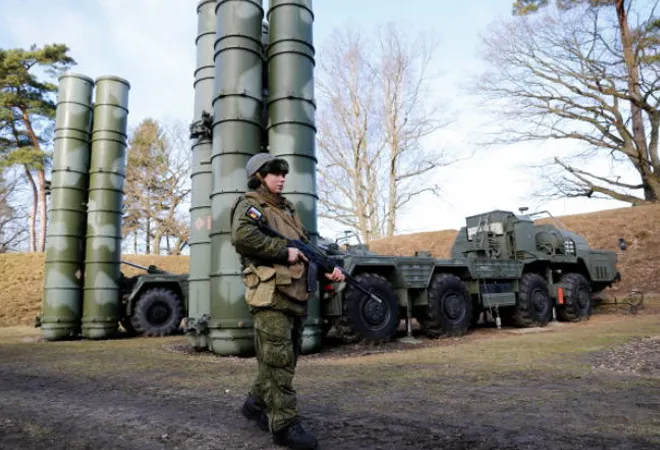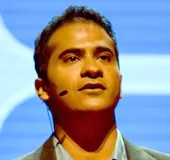
Apropos of all things that fly, the first batch of the S-400s missile defense system will soon arrive in India. Russian news agencies cited Dmitry Shugayev, head of the Russian military cooperation agency, who said the first S-400 unit will have touched Indian soil by the end of this year.
The US $5.5bn deal for five long-range surface-to-air missile systems between New Delhi and Moscow, to deter Beijing, has another component—Washington DC—as deliberations continue on whether India should get a waiver from the Countering American Adversaries Through Sanctions Act (CAATSA).
To Waive or Not to Waive
Recently, a bipartisan effort from US Senators and India Caucus Co-Chairs John Cornyn and Mark Warner urged President Biden to waive CAATSA sanctions against India for procuring military hardware from Russia.
Meanwhile, GOP Senator Ted Cruz, member of the Senate Foreign Relations Committee, along with Todd Young and Roger Marshall introduced the wordy CRUCIAL Act, which creates a 10-year exemption for member countries of the Quad, particularly designed to protect India from US sanctions under CAATSA, which was passed in 2017 and would likely undermine unity against China.
Sanctions, where did they come from:
In 1996, the United States Congress passed a law accentuating secondary sanctions, whereby third parties could face the adverse effects of sanctions simply for engaging with the primary party, the intended target of sanctions. Examples such as the Helms-Burton Act targeting Cuba and the Iran Sanctions Act targeting Iran are some pertinent examples.
In August 2017, just eight months into the Trump administration, Congress passed CAATSA, which started as an effort to target Russia, as there was a bipartisan disappointment towards Moscow’s meddling in the US elections and the annexation of Crimea in 2014. These sanctions are not just targeted towards Moscow, but include other adversaries in Tehran, Pyongyang, and Damascus.
Why CAATSA Would Strain the Partnership with Delhi:
Former envoy to India, Ambassador David C. Mulford, adds “these sanctions, are difficult to manage, hard to remove or even harder to forgive or forget later on when relations normalise”.
If CAATSA were enacted through the rigidity of laws, rather than the practicality of realpolitik, it would bring into question the very authenticity of the sanctions and further impinge on the burgeoning robust ties between Washington and New Delhi.
India isn’t an adversary and isn’t in any formal alliance with the US and, unlike Turkey, India’s isn’t a NATO signatory. As a strategic partner, India isn’t obligated to the US in the same manner as Ankara is.
Even since the dissolution of the Soviet Union, Russia continues to be India’s foremost defense supplier at nearly 50 percent, followed by France, Israel and the United States.
India’s strategic autonomy is sacrosanct to its foreign policy goals and the notion of multipolarity in this world order. India had repeatedly stated its needs for S400, and Jim Mattis, former Secretary of Defense, understood this strategic concern, but it fell on deaf ears as far as President Trump was concerned.
The Trump administration last year imposed sanctions over Turkey for its acquisition of the S-400, and strategic experts do see this as justified, since Ankara’s actions would undermine NATO cohesion. However, India sees the S-400 as vital to counter a belligerent China. Since the Indo-Pacific got codified as a term, there is a sense of Grand Strategy cohesion in Washington and New Delhi’s outlook in securing a “free and open Indo-Pacific” and as evinced in the Quad summit, a “rules based international order”.
India had repeatedly stated its needs for S400, and Jim Mattis, former Secretary of Defense, understood this strategic concern, but it fell on deaf ears as far as President Trump was concerned.
A waiver not granted to India won’t necessarily hurt India’s defenses on the borders as much as it would impinge on US strategic interests in the region. Furthermore, Washington is cognizant that the S-400 supplied by Moscow is not used by India against Pakistan, a major “non-NATO US ally”, but as a deterrent against China, a strategic adversary. The Washington myopia here for some is that the U.S. is threatening sanctions on India for a missile defense system that the US does not competitively produce.
Ashley J. Tellis, Senior Fellow at the Carnegie Endowment for International Peace speaking alongside Ambassador Mulford says, “one needs to look at India and CAATSA differently. Tellis says he is, “sympathetic to the CAATSA legislation based on what Russia has done in Europe and domestic politics back in the US, but one can hold simultaneously that CAATSA legislation is justified but applied to India is fundamentally counterproductive.”
Many see New Delhi as an inadvertent bystander to a larger problem between Russia and the US.
From Estrangement to Engagement:
In the past, there was a particular suspicion in New Delhi about Washington—which came to a crescendo during the Cold War and continued to impede cooperation even as interests converged, and values coalesced. New Delhi viewed Washington as a neo-colonialist power and feared unwelcome interference in its domestic and international affairs.
Tanvi Madan, Director of The India Project at the Brookings Institution, disagrees with Prime Minister Modi’s statement on how India and the US have overcome the hesitation of history” stating “those hesitations still lurk and CAATSA will bring it back in the forefront”.
AUKUS imbroglio notwithstanding, Paris as a major defense partner will use any subsequent fallout to leverage its own defense sales and fill the void left by Washington.
Madan identifies three groups that will leverage CAATSA sanctions for their own gains. The stream of US skeptics in India that have pushed back against successive Prime Ministers, Atal Bihari Vajpayee, Manmohan Singh, and Narendra Modi’s efforts in deepening ties with the US. The second group that Madan identifies is US competitors, particularly Russia, which has been fueling doubts about Washington’s reliability as a partner and wants to limit India-US ties. Third group interestingly identified by Madan are allies such as France. AUKUS imbroglio notwithstanding, Paris as a major defense partner will use any subsequent fallout to leverage its own defense sales and fill the void left by Washington.
Washington at times has struggled to walk the fine line between advocating values it deems sacrosanct and recognising, as Professor S.Paul Kapur, writes, “Indian democracy operates in the context of its own history, domestic political imperatives, and external threats, and will never look exactly like democracy in the United States or Western Europe”.
Hesitations of History:
The 1998 sanctions under the Clinton administration saw trade fall, relations hampered and a trust deficit growing. While sanctions were eventually lifted, India and the US were not allies but tentative strategic partners.
The sanctions for the Pokhran tests did set back commercial, defense and space relations back by a decade. The only thing that grew was a sense of trepidation then as the economic damage ensued and, hence, today, many see this as the reason for the strategic partnership over a formal alliance.
The US had made an exception in the Atomic Energy Act for the first time for India, which allowed India full access to civil nuclear technology while keeping its nuclear program in place.
From his time in government, Tellis recalls when the US were negotiating on the nuclear deal, Tellis states that Washington didn’t think that India would cut off its relations with Russia. “We had very difficult discussions on Russia and Iran. We reached mutual accommodations on foreign policy and autonomy.”
Hence the solution lies in Congress amending legislation to make an exception for India as done in the past during the Civil-Nuclear Arrangement. The US had made an exception in the Atomic Energy Act for the first time for India, which allowed India full access to civil nuclear technology while keeping its nuclear program in place.
Ambiguity of Sanctions:
Will the sanctions have its intended effect? The irony here would be, if CAATSA were to push India closer to Russia, rather than away.
There is a sense of ambiguity here given the lack of clarity and nebulousness of the intended target of the sanctions.
Former Foreign Secretary Kanwal Sibal riposte is that, “Russia too can feel vulnerable about its technology in American hands, given India’s closeness with the US, but Moscow has shown no such concerns”. In the unlikely event that Russia were to adopt a similar law on India for procurement of weapons from the US, New Delhi wouldn’t kowtow to those demands, ergo that same principle would need to apply.
The Kremlin and the White House see their partners differently but seldom has Moscow demanded that New Delhi make its choices publicly.
Non-Aligned but Firmly Partners:
Washington understands by now that New Delhi doesn’t seek a formal alliance and Washington does not need it to do so. India will continue its diplomatic relations with Tehran and defense relations with Moscow, while Washington will continue to engage with Islamabad as a major non-NATO ally.
India and China have still locked horns on the border, and Washington recognises the threat of Beijing’s belligerence, and the likelihood is strong that India will continue to rely on Russia for its defense equipment, irrespective of a S-400 waiver as Russia is a key supplier of defense equipment.
As India-US defense ties expand, military exercises become more frequent, the Indo-Pacific cooperation and maritime security becomes stronger and the Quad and the Middle East Quad begin to fructify, Washington and Delhi do not need any inadvertent policy to preclude great strategic initiatives.
The views expressed above belong to the author(s). ORF research and analyses now available on Telegram! Click here to access our curated content — blogs, longforms and interviews.




 PREV
PREV


